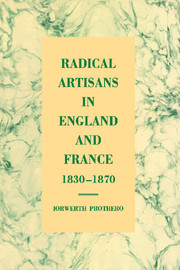Book contents
- Frontmatter
- Contents
- Acknowledgements
- List of abbreviations
- Introduction
- 1 Artisans
- 2 Radicalisms
- 3 Trade unionism
- 4 Work and radicalism
- 5 Socialism
- 6 Co-operation
- 7 Class and radicalism
- 8 Political action and organisation
- 9 Education and civilisation
- 10 Religions and philosophy
- 11 The culture of radical clubs
- Conclusion
- Notes
- Select bibliography
- Index
Introduction
Published online by Cambridge University Press: 24 November 2009
- Frontmatter
- Contents
- Acknowledgements
- List of abbreviations
- Introduction
- 1 Artisans
- 2 Radicalisms
- 3 Trade unionism
- 4 Work and radicalism
- 5 Socialism
- 6 Co-operation
- 7 Class and radicalism
- 8 Political action and organisation
- 9 Education and civilisation
- 10 Religions and philosophy
- 11 The culture of radical clubs
- Conclusion
- Notes
- Select bibliography
- Index
Summary
One of the great themes of nineteenth-century European history was the rise of labour, and this study looks at familiar elements in the process – trade unionism, political radicalism, co-operation, educational activities, and intellectual developments – in both Britain and France. But the period dealt with runs from the July Revolution in 1830 to the fall of the Second Empire in 1870, the period that preceded the rise of mass labour parties and trade unions, and the focus is on artisans, the male workers whose place in the formation of the modern European world is not always clear.
I am fully aware that the scope of such a large and ambitious topic runs the danger of superficial generality and cannot do justice to the complexity and detail of activities in every locality at every time. The aim, however, is not coverage but interpretation, and I have tried to explore what seem to me key general questions in relation to detailed instances. To avoid superficiality I have relied on my own primary research and not engaged in a distillation or reinterpretation of other secondary writings, but the unavoidable limits of this research mean that whole areas are not considered. The focus is primarily on some of the great cities, most of all the two capitals that were the main centres of labour politics in the period.
It is a defect of most historical research that it is confined to a single country, and as a Welshman living and working in England I am anxious to break free of such national limitations and parochialism, as well as being aware of the misleading nature of the title – Scotland is not considered, but some Welsh examples are drawn on, and Wales, of course, is not part of England.
- Type
- Chapter
- Information
- Publisher: Cambridge University PressPrint publication year: 1997

